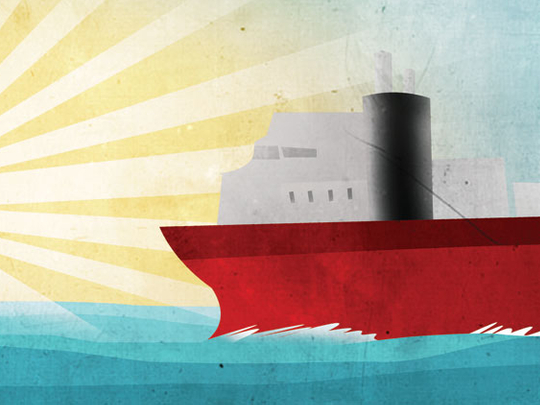
With the inauguration of the Habshan-Al Fujairah pipeline for carrying oil from Abu Dhabi’s productive oil fields to the exporting port in Fujairah on the Oman gulf, the UAE has taken an important strategic, economic, and environmental step.
This pipeline, which extends 350 kilometres from oil fields overlooking the Arab Gulf to Fujairah, resembles a quantum leap in the UAE’s oil industry.
This is the first time the UAE is able to export around 1.5 million oil barrels a day or 50 per cent of the UAE’s oil production without having to pass through the Strait of Hormuz which is surrounded by dangers and where almost 30 per cent of the world’s crude oil exports pass.
Strategically this will spare the UAE the danger of halting its oil exports if the Strait of Hormuz is closed down — as Iran is constantly threatening to do.
The Strait is equally threatened by the European Union’s embargo over Iranian oil since July, accompanied by new threats from Iran that it will close down the Strait of Hormuz if the embargo affects it badly.
The Iranian threats include cutting off oil export of GCC countries to punish the West to damage its economies and create a crisis which cannot be borne by the global economy in light of its current economic crises.
In this context, a number of Iranian lawmakers presented a project to the Iranian Parliament urging the government to cut off oil supplies going through the Strait of Hormuz to countries which support the oil embargo on Iran.
If the Strait of Hormuz is belittled in its strategic importance, a very important pressure badly used by Iran currently will be taken away from it.
The launching of the Habshan-Al Fujairah pipeline will allow and secure the flow of most of the UAE’s oil exports regardless of the threats surrounding the Strait.
This will be very important not only for the UAE’s economy alone, but will also secure stable oil supplies across the globe which is essential for international growth.
The new oil exporting centre will also give the UAE an almost complete independence from the Strait of Hormuz, giving its oil exports more flexibility, which is an important development in the UAE oil industry sector.
The volume of exports through this new pipeline will secure Abu Dhabi and the UAE with all it financial demands because of the expected rise in oil prices. Hence, this will protect by turn development rates and secure them away from the constant tension in the Gulf region.
In this context as well, the expenses of transporting Emirati oil will drop, in addition to the high insurance rates in the Gulf region because of its high risk nature.
This will give the UAE exported oil added marketing preferences and will increase its competitiveness in global markets not because of its low transport and insurance costs alone but because of its secure supplies as well, which will lead to more trust in national oil companies in their dealings with their international partners.
Economically, the Habshan-Al Fujairah pipeline will contribute actively towards enhancing a balanced development inside the UAE, especially as the economies of the northern emirates are in need of added investments to be close to the same levels of development achieved in the oil emirates. This move will accomplish one of the most important strategic development targets of a balanced development in the UAE.
Fujairah’s infrastructure will be developed as a result, especially the oil exporting port and the roads network connected to the port area.
This project will also provide hundreds of high salaried work opportunities for UAE nationals. It will also contribute to activate the services sector, the marine transport sector in particular and similar developments in Abu Dhabi which will equally make use of the steady oil revenues.
The Habshan-Al Fujairah pipeline will offer a great service in maintaining the environment in the Gulf region where hundreds of trade carriers and ships cross every day, transforming the area into one of the most polluted seas of the world.
A number of these carriers throw away the remnants of their tanks in the Gulf waters, which increases the harmful pollution in the environment and marine life which constitutes of an important food source for the people of the region.
The launching of this new pipeline will also mean a drop in the number of carriers entering the Gulf region from the Strait of Hormuz, thus the pollution resulting will drop as well. Carrying oil through pipelines does not impose an important threat to wild desert life, as it is minute and unmentionable in comparison to the benefits that will be reaped once the pipelines are operated.
And if those are some of the strategic, economic, and environment reflections of the Habshan-Al Fujairah pipeline, then this orientation must gain a long term Gulf strategic dimension which points to the necessity of cooperation between GCC countries to take advantage of the distinctive location of each of the UAE and Oman to extend more Gulf oil pipelines to export ports on the Gulf of Oman.
This will secure the oil from the threats of the Strait of Hormuz and makes use of the many positive benefits that can be obtained from the existence of a comprehensive Gulf network for carrying oil and gas.
If we exclude Saudi Arabia, which owns pipelines extended to transport oil from the Gulf to the Red Sea and bypassing the Strait of Hormuz, we find that there are three Gulf countries such as Kuwait, Qatar, and Bahrain that depend on the Strait completely for their oil exports, including the bigger part of Saudi oil exports.
This in itself holds grave dangers and instability.
GCC countries will feel the importance of the UAE’s experience strategically and economically which may lead to their adopting similar measures, where they may consider connecting Habshan in Abu Dhabi to Fujairah with other pipelines coming from other GCC countries.
This step will resemble a quantum leap not only in the Gulf oil industry but also in the area of Gulf cooperation and integration for the stability of Gulf economies which have become the centre of global attention because of what they provide as resources and a large inventory of energy
*Dr. Mohammad Al Asoomi is a UAE economic expert and specialist in economic and social development in the UAE and the GCC countries.












